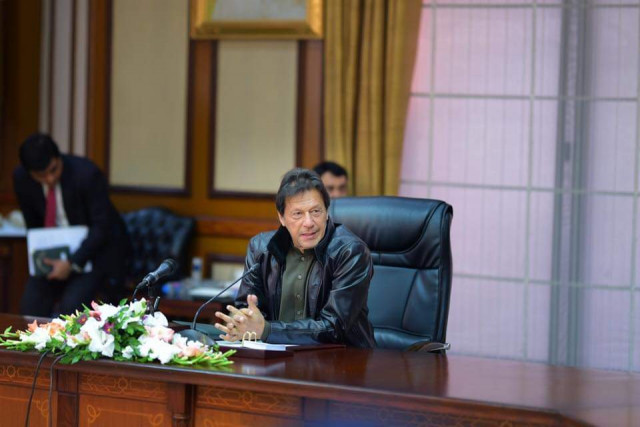Iknomics: Pakistan needs PM’s wealth creation plan with slight changes
It can help reduce poverty through job creation

PM Imran Khan. PHOTO: PTI
Imran talked about Pakistan’s rich natural resources and how we failed to optimally utilise them. Another feature of his speech was the emphasis on self-reliance and economic sovereignty. He also highlighted how stunted growth was a demonstration of ‘shocking poverty’ in the country.
In this second article on Iknomics, I present an analysis of his speech, which presents his vision of economic growth and inclusive development. This article is about wealth creation, poverty reduction and self-reliance.Pakistani state was born poor. In 1947, the state had no money and had already fought one war with India and struggled to get its share of foreign exchange for four years. Yet, it had a fair number of rich families.
Ispahanis owned Orient Airways, which was later taken over by the state through enactment of a law in 1956 and renamed as Pakistan International Airlines. Cowasjees owned a shipping line, which was ultimately crippled by Pakistani state’s advent into this business when Pakistan National Shipping Corporation was formed in 1961.
We had Habib family, which owned Habib Bank, and also Adamjee which established Muslim Commercial Bank. Many of these families provided tremendous financial support to a poor Pakistani state in the early days. These families also got privileges during the Ayub Khan regime, which Imran remembers as a decade of development.
The country was moving ahead with socio-economic disparities, but it was following a clearly written script of development economists which foresaw that a country needed to achieve high economic growth first. In 1966, then Planning Commission chief Dr Mehboobul Haq, one of the architects of this development model, declared that 80% of financial resources were concentrated in 22 families. His analysis was correct but its prognosis was a socialist manifesto.
About the same time, Zulfikar Ali Bhutto, who had resigned from Ayub’s cabinet to launch his political career, picked up this theme and made nationalisation a cornerstone of his socialist manifesto.
In 1972, Bhutto fulfilled his promise to the people. The whole country was nationalised in a matter of months, which not only included large-scale financial enterprises and industries but also small-scale industries such as flour mills. This was the biggest - and the most fatal - blow to wealth creation, investor confidence and industrialisation in Pakistan. In my humble opinion, we have not recovered from this shock till today.
Imran is giving the right messages – we need to go back to basics. Let wealth be created which, as Dr Khalil Ahmad says, “won’t stink in the lockers”. But obviously, it is a much bigger challenge that cannot be addressed by simply setting up a unit for the ease of doing business in the Prime Minister’s Secretariat.
A litmus test will be how many such units are established in all provinces and all major cities of Pakistan? And obviously, how can they address the taxing problems which an entrepreneur in Pakistan faces today?
Poverty reduction
Wealth creation leads to poverty reduction through jobs creation. This is the essence of history from China, which lifted 700 million people out of poverty and also Malaysia, where poverty rate today is 0%. However, none of these countries embarked on a “coordinated poverty alleviation programme” and it is where Iknomics needs a correction.
The coordination was achieved through the industrial policy which linked external demand with local resources. I met the first official of Malaysian investment agency, MIDA, who was hired in 1969. As a civil servant, he is credited with bringing first foreign investment – Intel - in the electronics industry.
The key lesson: setting up a helpful environment for investor, which includes property rights protection to begin with is essential.
Secondly, how an industry can provide jobs was another concern. This kind of coordination is necessary. However, I really hope that the prognosis of a “coordinated poverty alleviation programme” is not another National Rural Support Programme!
If done right, such programmes can help in producing individual small-scale enterprises but in no way they can reduce the poverty level. Those unfortunate families which cannot feed their children enough to meet their basic nutrition level cannot grow out of poverty through micro-finance. They need good education and good health - public goods in which state and civil society must play a far more aggressive role.
Self-reliance
A recurring theme in Iknomics is self-reliance and economic sovereignty: I dislike the mantra of self-reliance and prefer the narrative of economic sovereignty. To begin with, there is no country in the world which is developed through self-reliance, in the sense of autarky. The US has grown as a large open economy, running huge trade deficits, yet commanding on enormous trade volumes. China has also grown as a mixed economy, enjoying trade surplus, but again by aggressively trading with the world. Economic sovereignty should be about economic policy which is the space a country has to exercise a relative degree of control.
In this sense, Pakistan is not a sovereign country. However, it is free to choose a future direction. It is where Iknomics should be focused. It rightly emphasises wealth creation through facilitating businesses - big or small. However, it must not lead to obsession with ‘Make in Pakistan’- which is often a façade to hide our lack of competitiveness.
The writer is founder of PRIME Institute and is currently working as CEO of IDEAS, Malaysia
Published in The Express Tribune, December 17th, 2018.
Like Business on Facebook, follow @TribuneBiz on Twitter to stay informed and join in the conversation.



















COMMENTS
Comments are moderated and generally will be posted if they are on-topic and not abusive.
For more information, please see our Comments FAQ